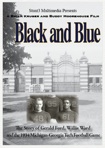New movie 'Black and Blue' focuses on Willis Ward, Gerald Ford, and a historic Michigan football game

That’s just one of the lessons learned from “Black and Blue: The Story of Gerald Ford, Willis Ward and the 1934 Michigan-Georgia Tech Game,” a new movie being released by local production company Stunt3 Media. The film will have a premiere free screening at the Gerald R. Ford Presidential Library, at 1000 Beal Ave., at 7 p.m. Friday, Nov. 18.
The gentlemen’s agreement in question concerned what happened, in the early 20th century, when a college team from the South played a football game against a squad from the North. As a bow to Jim Crow laws, the northern team would quietly bench all black athletes for the game, while the Southern team would bench the same number of players of similar caliber.
The University of Michigan football team was scheduled to play Georgia Tech in the fall of 1934, and consequently, news spread that one of the team’s stars, Willis Ward, would be benched for the game—much to the anger of many U-M faculty, students, and Ward’s best friend and teammate, Gerald Ford.
Not only did the team, which had been undefeated national champions the two previous years, begin the season with 2 losses, but “there were faculty petitions and student petitions,” said Brian Kruger, who made the movie with fellow filmmaker Buddy Moorehouse. “They got enough signatures, but it didn’t matter. (Athletic director and former football coach Fielding) Yost was too powerful.”
PREVIEW
"Black and Blue: The Story of Gerald Ford, Willis Ward and the 1934 Michigan-Georgia Tech Game"
- What: Documentary about the friendship between Gerald Ford and Willis Ward, who played football for the University of Michigan in 1934, when a game with Georgia Tech forced superstar Ward to be benched because he was black.
- Where: Gerald R. Ford Presidential Library, 1000 Beal Ave.
- When: Friday, November 18 at 7 p.m.
- How much: Free.
“(Georgia Tech) wasn’t as big of a program as they are now,” said Kruger. “They hadn’t won a national championship yet. But Yost really wanted a southern team to come up and play. You have to wonder why he’d schedule that (Georgia Tech) game, knowing full well what would happen. This is not in the movie—it’s just my opinion—but I think part of it was, he had a big stadium to fill, and there were a lot of southerners working in the local factories, and if Michigan played a southern team, maybe those workers would come watch them.”
Initially, Ford quit the team in protest of Ward being benched. But Ward—who was receiving threats—urged Ford to play, arguing that his absence might just make things worse for Ward.
So Ford started for the first time at center against Georgia Tech, playing lights out to help lead the Wolverines to what would be the team’s only victory for the season. (They scored only 12 points total after the Georgia Tech game, and all those points were scored by Ward.) Both Ford and Ward would later say that the Georgia Tech game killed the team’s soul.
Yet the two—who met on the first day of freshman orientation—remained lifelong, faithful friends (and Michigan fans), demonstrating that, in terms of thinking about race, the two were far ahead of the mainstream curve.
“Gerald Ford had been adopted as a kid, so he had a little bit of an outsider mentality,” said Kruger. “I think he saw himself as different. … Ford came from Grand Rapids, which was a very white town, and there was a large Klan population in Grand Rapids at the time. But when he got to Ann Arbor, I think he just thought, ‘Here’s this guy who’s different, too, and he seems like a cool guy—he can be my friend.”
The future president never used the story of his friendship with Ward for political purposes, and in fact, his own son didn’t hear the story until U-M retired Ford’s number in 1994. Ward, who was from Detroit, went on to a successful career as a lawyer and judge in Wayne County.
“As you see in the movie, the university dealt with (the Georgia Tech) problem by doing nothing and saying nothing, and … you’d think it would be different 80 years later,” said Kruger. “But it’s not. … Personally, I would get in front of the story and say, ‘We didn’t act respectfully, but look what we’ve become—a beacon for civil rights leadership. Even Michigan stumbled back then, but look where we are now.’”
In some ways, though, the past never quite leaves us, Kruger said: “Why do you think Michigan's never scheduled a game with Georgia Tech again?”
Jenn McKee is the entertainment digital journalist for AnnArbor.com. Reach her at jennmckee@annarbor.com or 734-623-2546, and follow her on Twitter @jennmckee.


Comments
romuloid
Fri, Dec 7, 2012 : 1:06 p.m.
Growing up in Grand Rapids, maybe Ford experienced discrimination in the Dutch-dominated culture of the city. You know what they used to say about GR.....If you ain't Dutch, you ain't much.